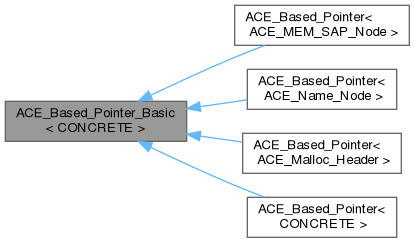A proxy that keeps track of the relative offset of a "pointer" from its base address. This class makes it possible to transparently use "pointers" in shared memory as easily as programming with pointers to local memory. In particular, we don't need to ensure that the base addresses of all the pointers are mapped into separate processes at the same absolute memory base address. More...
#include <Based_Pointer_T.h>

Public Attributes | |
| ACE_ALLOC_HOOK_DECLARE | |
| Declare the dynamic allocation hooks. | |
Protected Attributes | |
| ptrdiff_t | target_ |
| ptrdiff_t | base_offset_ |
| Keep track of our offset from the base pointer. | |
Detailed Description
A proxy that keeps track of the relative offset of a "pointer" from its base address. This class makes it possible to transparently use "pointers" in shared memory as easily as programming with pointers to local memory. In particular, we don't need to ensure that the base addresses of all the pointers are mapped into separate processes at the same absolute memory base address.
Constructor & Destructor Documentation
◆ ACE_Based_Pointer_Basic() [1/5]
This constructor initializes the <base_offset_> by asking the <ACE_BASED_POINTER_REPOSITORY> Singleton for the base address of the memory region within which it is instantiated. Two results are possible:
- An <ACE_*_Memory_Pool> has stored a base address/size pair and the new based-pointer instance is located between the base address and the base address + size - 1. In this case, the repository returns the base address.
- No suitable address/size pair was found. The repository assumes an address in the regular (not mapped) virtual address space of the process and returns 0. In this case, the based-pointer uses its address as an offset to it's base address 0.
◆ ACE_Based_Pointer_Basic() [2/5]
| ACE_Based_Pointer_Basic< CONCRETE >::ACE_Based_Pointer_Basic | ( | CONCRETE * | initial | ) |
Initialize this object using the initial pointer. This constructor initializes the <base_offset_> by asking the <ACE_BASED_POINTER_REPOSITORY> Singleton for the base address of the memory region within which it is instantiated. Three results are possible:
- An <ACE_*_Memory_Pool> has stored a base address/size pair and the new based-pointer instance is located between the base address and the base address + size - 1. In this case, the repository returns the base address.
- No suitable address/size pair was found. The repository assumes an address in the regular (not mapped) virtual address space of the process and returns 0. In this case, the based-pointer uses its address as an offset to its base address 0.
- If initial is 0 then set the value of <target_> to -1, which indicates a "NULL" pointer.
◆ ACE_Based_Pointer_Basic() [3/5]
|
delete |
◆ ACE_Based_Pointer_Basic() [4/5]
|
delete |
◆ ACE_Based_Pointer_Basic() [5/5]
| ACE_Based_Pointer_Basic< CONCRETE >::ACE_Based_Pointer_Basic | ( | const void * | base_addr, |
| int | o ) |
Constructor for know base address. o is only used to resolve overload ambiguity.
Member Function Documentation
◆ addr()
|
inline |
Returns the underlying memory address of the smart pointer.
◆ dump()
| void ACE_Based_Pointer_Basic< CONCRETE >::dump | ( | ) | const |
Dump the state of the object.
◆ operator CONCRETE *()
|
inline |
Returns the underlying memory address of the smart pointer.
◆ operator!=()
|
inline |
◆ operator*()
|
inline |
◆ operator+=()
|
inline |
◆ operator<()
|
inline |
◆ operator<=()
|
inline |
◆ operator=() [1/2]
|
inline |
◆ operator=() [2/2]
|
inline |
◆ operator==()
|
inline |
◆ operator>()
|
inline |
◆ operator>=()
|
inline |
◆ operator[]()
|
inline |
Member Data Documentation
◆ ACE_ALLOC_HOOK_DECLARE
| ACE_Based_Pointer_Basic< CONCRETE >::ACE_ALLOC_HOOK_DECLARE |
Declare the dynamic allocation hooks.
◆ base_offset_
|
protected |
Keep track of our offset from the base pointer.
◆ target_
|
protected |
The documentation for this class was generated from the following files: